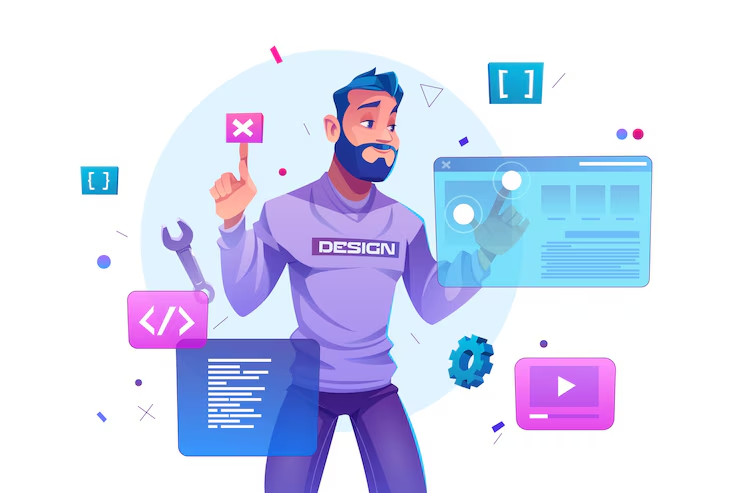





Freelance Ecommerce Website Developer: Building Your Online Business Success
In today’s digital age, having an online presence is no longer optional for businesses — it’s essential. Ecommerce websites have become the backbone of retail, enabling companies to reach a global audience, boost sales, and create lasting customer relationships. But behind every successful ecommerce store is a skilled developer who brings the vision to life. This is where a freelance ecommerce website developer plays a crucial role.
Who Is a Freelance Ecommerce Website Developer?
A freelance ecommerce website developer is an independent professional who specializes in designing, developing, and maintaining online stores. Unlike full-time employees who work for a single company, freelancers offer their expertise on a project-by-project basis. They work remotely and collaborate directly with clients — small businesses, startups, and even established enterprises — to build custom ecommerce solutions tailored to their unique needs.
Why Hire a Freelance Ecommerce Developer?
1. Cost-Effectiveness
Hiring a full-time ecommerce developer can be costly, especially for startups or small businesses. Freelancers offer a flexible pricing model, often charging per project or hourly rates. This approach allows businesses to control costs while still receiving professional services.
2. Specialized Expertise
Many freelance ecommerce developers specialize in particular platforms or technologies like Shopify, WooCommerce (WordPress), Magento, BigCommerce, or custom-built solutions using frameworks such as Laravel or React. Their focused expertise ensures your online store benefits from industry best practices and the latest technologies.
3. Flexibility and Speed
Freelancers often have the agility to start projects quickly and adapt to changing client requirements without the bureaucracy of larger agencies. This flexibility helps businesses launch their stores faster and respond to market trends in real time.
4. Personalized Attention
Unlike large agencies handling multiple clients simultaneously, freelance developers typically work with fewer clients at a time. This means more personalized service, closer communication, and a deeper understanding of your business goals.
Key Skills of a Freelance Ecommerce Website Developer
To create a successful ecommerce website, a freelance developer must have a diverse skill set, including:
Frontend Development: Expertise in HTML, CSS, JavaScript, and responsive design to create visually appealing and user-friendly interfaces.
Backend Development: Knowledge of server-side languages like PHP, Python, Ruby, or Node.js, and experience managing databases (MySQL, MongoDB) to ensure smooth operation and scalability.
Ecommerce Platforms: Proficiency in popular platforms like Shopify, WooCommerce, Magento, or custom ecommerce frameworks.
Payment Gateway Integration: Ability to securely integrate payment methods such as PayPal, Stripe, and credit card processing.
SEO Best Practices: Implementing search engine optimization strategies to improve visibility and organic traffic.
Security: Ensuring secure data handling, SSL integration, and protection against cyber threats.
UI/UX Design: Crafting an intuitive user experience that encourages engagement and conversions.
API Integration: Connecting the ecommerce site with third-party services like shipping providers, inventory management, and marketing tools.
What Does a Freelance Ecommerce Developer Do?
1. Requirement Gathering and Planning
The developer begins by understanding the client’s business model, target audience, product range, and functional requirements. This phase is crucial for deciding the platform, technology stack, and design approach.
2. Design and Development
The freelance developer designs wireframes and prototypes, then proceeds to develop the frontend and backend of the website. This stage includes creating product pages, shopping carts, user accounts, checkout flows, and admin panels.
3. Payment and Shipping Integration
They integrate reliable payment gateways and shipping modules to streamline the buying and delivery process.
4. Testing and Quality Assurance
Thorough testing is conducted to identify bugs, ensure cross-browser compatibility, responsiveness, and smooth user experience across devices.
5. Deployment and Maintenance
Once the website is live, the developer may provide ongoing support, updates, and optimizations based on user feedback and business growth.
How to Hire the Right Freelance Ecommerce Developer?
Finding the right freelancer can be challenging. Here are some tips:
Check Portfolio: Review their previous ecommerce projects to gauge their expertise and design style.
Look for Reviews and References: Client testimonials and feedback offer insight into their reliability and communication skills.
Technical Skills: Ensure their skill set matches your platform and project complexity.
Communication: Clear and timely communication is critical, especially for remote collaboration.
Post-Launch Support: Clarify if they offer maintenance services or training for your team.
Popular Platforms Freelance Ecommerce Developers Work On
Ideal for businesses wanting a simple, hosted solution with plenty of apps and themes. Freelancers customize Shopify stores using Liquid (Shopify’s templating language) and integrate third-party services.
WooCommerce
A WordPress plugin that turns a site into an ecommerce store. WooCommerce offers flexibility and is suitable for small to medium-sized stores. Freelancers often build custom themes and extend WooCommerce functionality.
A powerful open-source platform for larger, complex stores with extensive product catalogs and custom features. Freelancers with Magento expertise handle more sophisticated development and integrations.
Custom Solutions
For businesses with very specific needs, freelancers can build bespoke ecommerce websites from scratch using frameworks like Laravel, Django, or React combined with backend APIs.
Trends in Ecommerce Development to Watch
Mobile-First Design: With mobile shopping soaring, developers focus on seamless mobile experiences.
Headless Ecommerce: Decoupling frontend and backend for faster performance and more flexibility.
AI and Personalization: Incorporating AI-driven recommendations and chatbots to enhance customer engagement.
Voice Commerce: Optimizing for voice search and purchases.
Sustainability: Eco-friendly ecommerce sites focusing on green hosting and ethical product sourcing.
A freelance ecommerce website developer can be the catalyst for your online business success. Whether you’re launching your first online store or revamping an existing one, a skilled freelancer offers the expertise, flexibility, and personalized service to meet your goals without the overhead of a traditional agency.
Choosing the right freelance developer means investing in a partner who understands your vision and turns it into a seamless, engaging shopping experience that drives sales and builds customer loyalty.
Freelance eCommerce Website Developer: Everything You Need to Know
In the digital age, eCommerce has revolutionized the way businesses operate. From small startups to multinational corporations, selling products and services online has become essential. And at the heart of this transformation are freelance eCommerce website developers — professionals who design, build, and maintain online stores that drive sales and enhance user experiences.
If youre considering hiring a freelance eCommerce developer or planning to become one, this comprehensive guide will walk you through everything you need to know — including roles, skills, platforms, benefits, and challenges.
Who is a Freelance eCommerce Website Developer?
A freelance eCommerce website developer is an independent professional who creates and maintains online stores for clients. Unlike developers working for agencies or companies, freelancers typically work on a project basis and offer flexible, customized solutions.
They can work with platforms like Shopify, WooCommerce, Magento, BigCommerce, Wix, and custom-coded solutions using PHP, Laravel, Node.js, or other technologies.
Key Responsibilities of a Freelance eCommerce Developer
Freelance eCommerce developers handle a wide range of tasks, including:
1. Consultation and Planning
Understanding the client’s business model and target audience.
Identifying the right eCommerce platform.
Planning site structure, payment integration, and product management systems.
2. Design and Development
Creating responsive and user-friendly UI/UX.
Developing the front-end and back-end features.
Integrating third-party tools like payment gateways, shipping modules, and inventory systems.
3. Customization
Tailoring themes or developing custom themes.
Writing custom plugins or extensions to meet unique business needs.
4. Performance Optimization
Ensuring fast load times and smooth user navigation.
Optimizing the site for mobile devices and search engines (SEO).
5. Security and Compliance
Implementing SSL certificates, secure payment systems, and data protection.
Ensuring the website complies with regulations like GDPR or PCI-DSS.
6. Ongoing Maintenance and Support
Providing technical support and bug fixes.
Updating plugins, themes, and platform versions.
Essential Skills for a Freelance eCommerce Developer
To succeed in the freelance world, developers need more than just technical expertise. Here are the key skills required:
Technical Skills:
HTML, CSS, JavaScript, PHP – Core web development languages.
eCommerce platforms – Shopify, WooCommerce, Magento, BigCommerce, PrestaShop.
Database Management – MySQL, PostgreSQL, MongoDB.
Version Control – Git, GitHub.
API Integration – Payment gateways, shipping APIs, CRM systems.
Design Skills:
UI/UX design principles.
Familiarity with tools like Adobe XD, Figma, or Sketch.
Business and Soft Skills:
Client communication and project management.
Problem-solving and adaptability.
Time management and self-discipline.
Knowledge of digital marketing and SEO is a plus.
Why Hire a Freelance eCommerce Developer?
Hiring a freelance eCommerce developer offers several advantages over agencies or full-time employees:
1. Cost-Effective
Freelancers typically charge lower rates than agencies, making them ideal for startups or small businesses.
2. Flexibility
You can hire freelancers for specific tasks, short-term projects, or ongoing maintenance.

3. Specialized Expertise
Many freelancers specialize in specific platforms or industries, offering deep domain knowledge.
4. Direct Communication
You work directly with the developer, which often leads to faster turnaround times and clearer communication.
Popular eCommerce Platforms for Freelancers
Freelancers often specialize in one or more eCommerce platforms. Heres an overview of the most popular ones:
Easy to use, hosted solution.
Ideal for small to medium businesses.
Developers work with Liquid (Shopify’s templating language).
WooCommerce
Built on WordPress, open-source.
Highly customizable and SEO-friendly.
Great for businesses already using WordPress.
Magento (Adobe Commerce)
Suitable for large-scale businesses.
Offers extensive customization and scalability.
Requires advanced development skills.
BigCommerce
Hosted platform with robust features.
Supports headless commerce and multichannel selling.
Custom Solutions
Built using frameworks like Laravel, Django, or Express.js.
Offers complete flexibility and control.
Requires more development time and higher technical expertise.
How to Become a Freelance eCommerce Developer
If youre aspiring to become a freelance eCommerce developer, follow these steps:
1. Learn the Fundamentals
Master HTML, CSS, JavaScript, and back-end technologies.
Get hands-on experience with popular eCommerce platforms.
2. Build a Portfolio
Create demo eCommerce websites or offer your services at a discounted rate to build experience.
Include case studies, testimonials, and project showcases.
3. Set Up Your Online Presence
Create a professional website with your services, pricing, and contact info.
Optimize your LinkedIn and GitHub profiles.
4. Join Freelance Platforms
Sign up on sites like Upwork, Freelancer, Fiverr, and Toptal.
Build your profile, bid on projects, and maintain high ratings.
5. Market Your Services
Use content marketing, social media, and SEO to attract clients.
Network through forums, LinkedIn groups, and local business communities.
Challenges Faced by Freelance eCommerce Developers
Freelancing isn’t without its difficulties. Common challenges include:
1. Client Management
Some clients may have unclear requirements or change scope mid-project.
2. Inconsistent Workload
There might be busy months and dry spells.
3. Payment Issues
Late payments or non-payment is a risk in freelancing.
4. Keeping Up with Technology
Constant updates in eCommerce platforms and web technologies require ongoing learning.
Tips for Success
Define clear contracts with milestones, deliverables, and payment terms.
Use project management tools like Trello or Asana to stay organized.
Set realistic expectations for timelines and revisions.
Invest in continuous learning through courses, tutorials, and certifications.
Focus on client satisfaction to build a strong reputation and get repeat business.
A freelance eCommerce website developer plays a crucial role in helping businesses succeed online. Whether youre an entrepreneur looking to launch an online store or a developer aiming to break into freelancing, the opportunities are vast.
By combining technical skills with business acumen and excellent communication, freelance developers can build a thriving career, enjoy creative freedom, and work with clients across the globe.
If youre looking to hire or become a freelance eCommerce developer — now is a better time than ever.
Who is a Freelance eCommerce Website Developer?
A freelance eCommerce website developer is an independent professional who specializes in designing and developing online stores for clients. Unlike in-house developers who work for one company, freelancers work on a project-by-project basis, often juggling multiple clients. They possess both technical and creative skills and are responsible for creating user-friendly, responsive, and secure eCommerce platforms.
They may work with popular platforms like:
WooCommerce (WordPress)
Magento (Adobe Commerce)
BigCommerce
Wix eCommerce
Custom solutions (Laravel, Node.js, etc.)
Key Responsibilities of a Freelance eCommerce Developer
The scope of work for a freelance eCommerce developer is broad and can vary depending on client needs. Typical responsibilities include:
1. Website Design and Development
Creating aesthetically pleasing and functional layouts
Developing product pages, shopping carts, and checkout systems
Ensuring mobile and cross-browser compatibility
2. Platform Customization
Customizing themes or building them from scratch
Adding and configuring plugins/extensions to enhance functionality
3. Payment Gateway Integration
Integrating secure and reliable payment systems like PayPal, Stripe, Razorpay, etc.
4. Performance Optimization
Improving site speed and load times
Implementing SEO best practices for better visibility
5. Security Implementation
Installing SSL certificates
Securing customer data and payment information
6. Ongoing Maintenance and Support
Updating software and plugins
Troubleshooting bugs and fixing errors
Adding new features as the business grows
Skills Required to Be a Successful Freelance eCommerce Developer
To thrive as a freelance developer in the eCommerce niche, one needs a mix of technical, creative, and soft skills:
Technical Skills:
Proficiency in HTML, CSS, JavaScript, and PHP
Knowledge of eCommerce platforms (Shopify, WooCommerce, Magento, etc.)
Experience with CMS (WordPress)
Understanding of APIs and third-party integrations
Database management (MySQL, MongoDB)
Design Skills:
Basic knowledge of UI/UX design principles
Familiarity with tools like Adobe XD, Figma, or Sketch
Soft Skills:
Effective communication and client management
Time management and organization
Problem-solving and critical thinking
Benefits of Hiring a Freelance eCommerce Developer

For businesses, working with a freelance developer offers several advantages:
Cost-Effective: Freelancers often charge less than agencies.
Flexibility: You can hire them on a per-project or hourly basis.
Specialized Skills: Freelancers often focus on specific platforms, offering deeper expertise.
Direct Communication: Clients work directly with the developer, leading to better collaboration.
How to Become a Freelance eCommerce Website Developer
If youre considering entering the freelancing world, here are some steps to help you get started:
1. Build Your Skill Set
Take online courses, attend bootcamps, and practice by building demo eCommerce sites.
2. Create a Portfolio
Showcase your work through a personal website that demonstrates your capabilities, past projects, and testimonials.
3. Choose Your Niche
Specialize in one or two platforms (like Shopify or WooCommerce) to stand out in a crowded market.
4. Register on Freelance Platforms
Sites like Upwork, Freelancer, Fiverr, and Toptal are great places to find eCommerce development gigs.
5. Market Yourself
Use LinkedIn, forums, and social media to promote your services. Blogging and SEO can also attract clients to your site.
6. Provide Excellent Service
Happy clients lead to referrals and repeat work. Communication, transparency, and professionalism are key.
Challenges Faced by Freelance eCommerce Developers
Despite the benefits, freelancing isnt without challenges:
Inconsistent Workflow: Project-based work can be unpredictable.
Client Expectations: Dealing with unclear or changing requirements.
Competition: The market is crowded, so standing out requires effort.
Self-Management: Freelancers must handle everything from billing to project management on their own.
However, with time, experience, and a solid reputation, these challenges can be managed or turned into strengths.
Future of Freelance eCommerce Development
The freelance economy is thriving, and eCommerce continues to grow rapidly, especially with the rise of mobile commerce, social selling, and global marketplaces. Technologies like AI, AR/VR shopping experiences, and headless commerce are pushing innovation forward.
Freelance eCommerce developers who stay updated with trends and continually refine their skills will find a wealth of opportunities in this evolving landscape.
The role of a freelance eCommerce website developer is crucial in helping businesses establish a powerful online presence. It’s a career that combines creativity, technology, and business insight. For businesses, hiring a freelance developer offers flexibility and expertise without the overhead of a full-time team. For developers, freelancing provides the freedom to choose projects, work from anywhere, and build a diverse portfolio.
Whether youre hiring or becoming one, understanding the full scope of this role can lead to successful collaborations and thriving online businesses.



